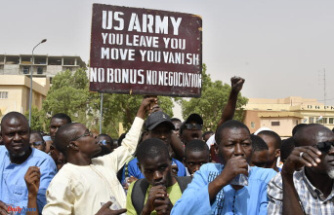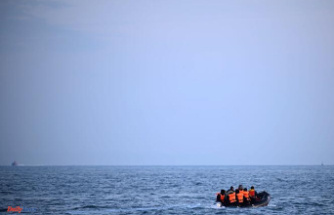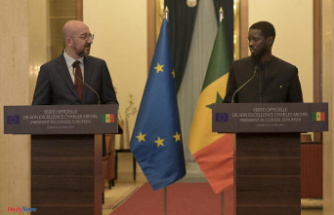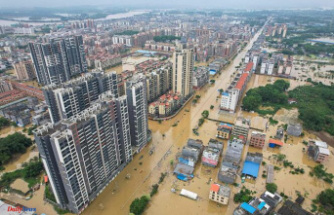The next few months of war will claim many victims and will not bring any decisive advantages to either side, fears military expert and former Colonel Wolfgang Richter. In an interview with ntv.de, he advocates dialogue with Russia and explains the channels through which this can be conducted.
ntv.de: Like most wars between states, this war must ultimately be ended through negotiations, and there is a broad consensus on that. How do you see Kiev's chances of hitting Russia hard enough with more Western weapons in the coming months to engage in serious talks?
Wolfgang Richter: I'm afraid that in addition to reserve brigades and millions of reservists, the Russians can also fall back on very large stocks of material. You can always add more than the West delivers. And even if it's older, less modern material, at some point in the battlefield, sheer mass will decide.
Ukraine has just launched an offensive in the south to recapture areas occupied by the attacker. With HIMARS from the USA, the troops destroy distant Russian weapons depots.
Yes, but that doesn't give them a decisive advantage, because the Russians have been using missiles of this range for weeks and have already destroyed a number of Ukrainian depots and production facilities. I am afraid that Kiev's army can only catch up with Russian capabilities.
At the beginning of the war there was not even that hope. Then things turned out differently.
The Russians initially had problems mainly because they had not adjusted to such a homogeneous and stubborn resistance from the Ukrainian army. The Russian attack on Kyiv was tactically and logistically poorly prepared. But Russia has now corrected these mistakes and is focusing on what its army is good at: It concentrates a lot of artillery in narrow spaces in order to achieve breakthroughs there through local fire superiority.
Meanwhile, there are increasing voices predicting a war of attrition that will last for years.
It is very likely that a point of exhaustion will come at some point, probably first with the Ukrainian troops, but that cannot yet be predicted with certainty. But if we have to reckon with the fact that this point will come without the big operational picture changing significantly, then we should think about the necessary dialogue that precedes a ceasefire as soon as possible. Otherwise, the losses will grow immeasurably without the situation changing significantly.
Russia's Foreign Minister Lavrov spoke at the G20 meeting himself and left the room before anyone could have answered. That doesn't exactly indicate a willingness to talk.
That's true, but there was no attempt to say beforehand that we'd talk to each other. Let me remind you that whenever Chancellor Scholz or French President Macron pick up the phone to speak to Putin, Eastern European countries in particular immediately protest and speak of betrayal. Such fundamental positions do not make sense, because a ceasefire that ends this war must be negotiated beforehand.
If there were signals from the West that it was willing to talk, the Kremlin would probably exploit it as a success in the state media. Do you have to accept that or can it be circumvented?
There is absolutely no point in launching a large-scale, high-profile discussion initiative that would only trigger a new propaganda battle without being able to end the war. Substantive negotiations do not begin through high-level public rhetoric, but on a small flame. They start with confidential conversations, in so-called back channels.
Who is talking to each other?
This can be high officials or diplomats, as is apparently the case when it comes to prisoner exchanges and grain deliveries. But talks can also take place between those who are no longer officially in office, but who still talk and are allowed to talk to each other: former general staff officers, ex-diplomats, scientists.
Can you give an example?
Back channels include the trilateral Deep Cuts Commission and the Track II dialogue between members of the Russian Academy of Sciences and representatives of American and European institutes. That way you can at least keep channels open until the moment when you realize that you have to formally negotiate with each other about the end of the war.
Is the West in position to open a dialogue?
In any case, Kyiv is primarily responsible for territorial issues, although France and Germany share some responsibility for the implementation of the Minsk agreements on the status of Donbass. However, when it comes to the question of Ukraine's possible NATO membership, that is a consensus decision within the alliance that is not made in Kyiv. Above all, the West must be concerned with avoiding an escalation. This also applies to containing the risks of the "Iron Belt" that NATO will build in the future from the North Cape to the Black Sea. It is important to avoid military incidents or to prevent their escalation.
How important is the NATO issue for Russia?
The first thing that needs to be explored in talks is: What is it really about for the Russians? We heard three different narratives: The question of NATO's eastward expansion towards Russia's borders has been haunting us for years. Unfortunately, the arms control agreements of previous years that restricted potential deployment areas have eroded. Now we have to see if we can do something about those spots.
The second narrative is neo-imperial and therefore non-negotiable: when Putin, and has been doing so since last summer, denies that there is a Ukrainian nation and identity and claims that it is Russian soil that must be reclaimed, then he obviously wants to restore the tsarist empire. Such a revisionist approach is incompatible with the principles of international law and the agreed European security order.
The third narrative, which is now in the foreground again, is the protection of the Russia-friendly population in Donbass. That is a rather limited goal, and with that in mind one would have to look again at the Minsk agreements and perhaps find a workable compromise.
What happens when such talks reveal what some experts suspect: that the neo-imperial motive is central to aggressive war?
If that were the case, then negotiations would indeed be hopeless at the moment. But it seems to me that Putin is more a tactician than a strategist, trying to gauge what is actually achievable. The December 2021 Russian proposals addressed the issue of NATO expansion and troop deployment limitations. We will only get more certainty if we enter into a substantive dialogue instead of making assumptions. Apparently both sides still believe in being able to achieve decisive advantages on the battlefield that could not be secured through negotiations. That is likely to change as the war of attrition moves toward exhaustion.
A month after the start of the Russian attack, Ukrainian President Zelenskyy presented a kind of negotiation package. Then Boucha's crimes became apparent.
The clarification and evaluation of the events in Bucha and the prosecution of war crimes should be left to an independent international investigation and judiciary. The fact that Zelenskyy's package from March was not pursued is more likely due to the euphoria after the Ukrainian army's first military successes in front of Kyiv.
How do you rate the suggestions he made at the time?
The package contained three elements: the first concerned renunciation of NATO membership, the second was a proposal to postpone the resolution of the Crimean issue for 15 years, and the third was an offer to grant Donbass a special status directly between the to negotiate presidents. In the meantime, Kyiv has replaced these proposals with maximum positions, such as the complete reconquest of all areas, including Crimea and the entire Donbass. The Russian leadership is also using revisionist rhetoric again. I think, however, that we have to go back to the proposals from March in perspective. They were on the table, they still seem relevant, and they're a starting point to start a conversation.
Frauke Niemeyer spoke to Wolfgang Richter
(This article was first published on Sunday, July 17, 2022.)












